
The house looks no different from the rest of the homes on the street. The façade is clean and unassuming; a pair of boxy cars parked in the driveway outside. A series of well-manicured bushes lines the walkway to the front door where our group is greeted by a tan zhu (壇主), a woman who has dedicated the second floor of her house to the installation of a Buddha hall (佛堂 fo tang). She will be our host for the next few days, during which we will share meals, perform rituals, and attend classes together.
I have traveled from Taiwan to the suburbs of Tokyo with three other women, all members of the religious group Yiguandao (一貫道).[1] Two of the women are missionaries, and will be teaching classes and providing spiritual leadership during their stay. The third woman is a believer from Taiwan’s west coast, thrilled at the chance to meet with fellow Yiguandao congregants in Japan and enjoy an international holiday.
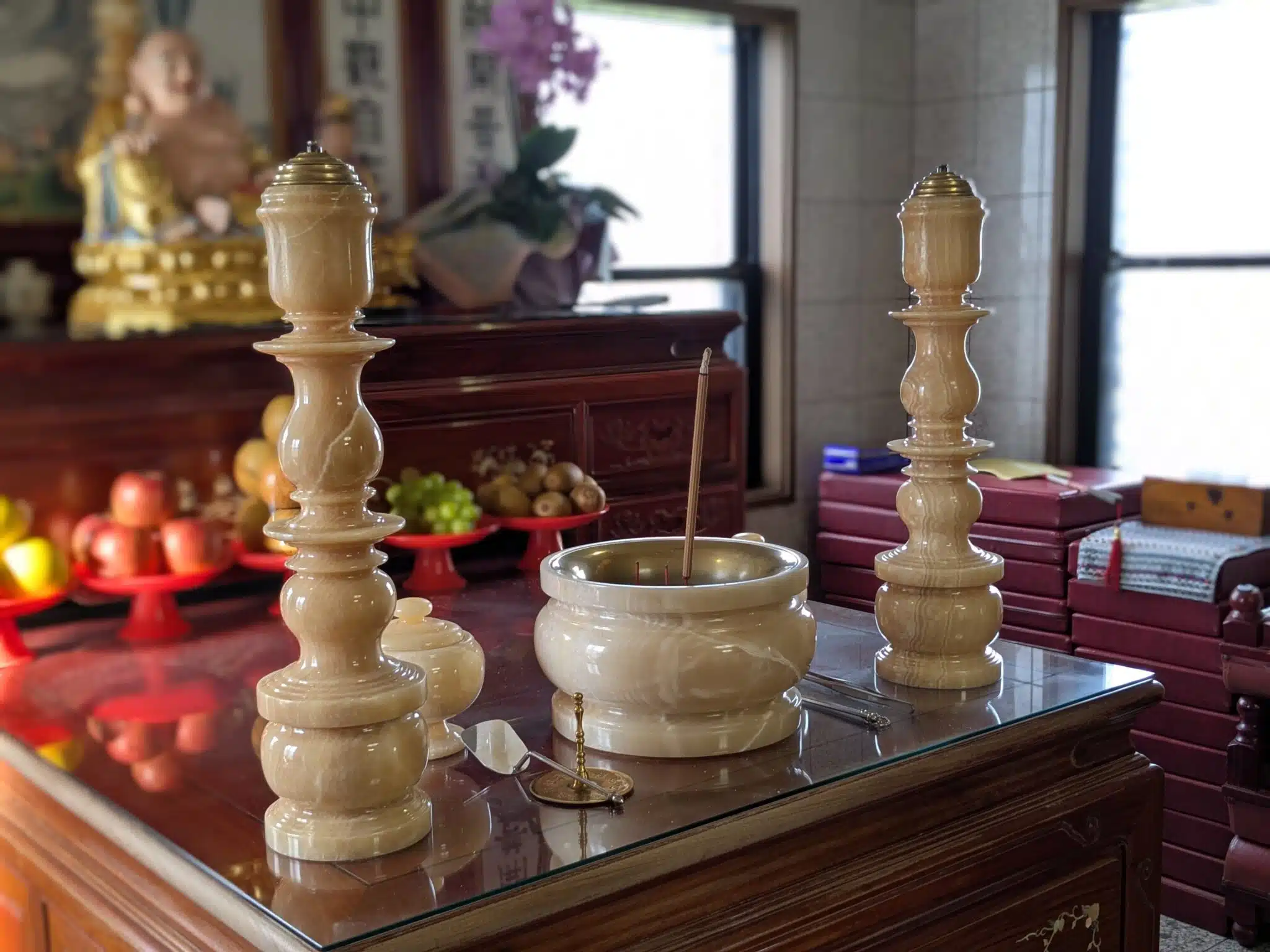
For the duration of our time in Tokyo, we are hosted at three separate Buddha halls by Taiwanese women who have each settled in Japan long-term. There is a Chinese name for Taiwanese hospitality: ren qing wei (人情味), a term with no English equivalent but one that refers to a sense of human warmth and kindness in social interactions. Ren qing wei describes our hosts’ hospitality to a tee: we stay free of charge, and each trip to the supermarket turns into a good-natured argument over who will pay for the groceries. Our hosts take us sightseeing during our down time, even while caring for their grandchildren. At every arrival and farewell, there is a flurry of gifts exchanged: bags of Taiwanese snacks and mooncakes offered on arrival and, on departure, we are laden with gifts to take back to fellow congregants and friends in Taiwan.
The women I travel with have all self-funded their trip to Tokyo, in keeping with the decentralized ethos at the heart of Yiguandao. Over two years of fieldwork, my impression of this community is one of dispersed but deeply connected groups of believers who turn their homes into worship spaces, warmly invite friends and family to group gatherings,[2] and willingly fund their own travel between Buddha halls across Southeast Asia—and the world[3]—in the shared pursuit of fellowship and, ultimately, the saving of souls.
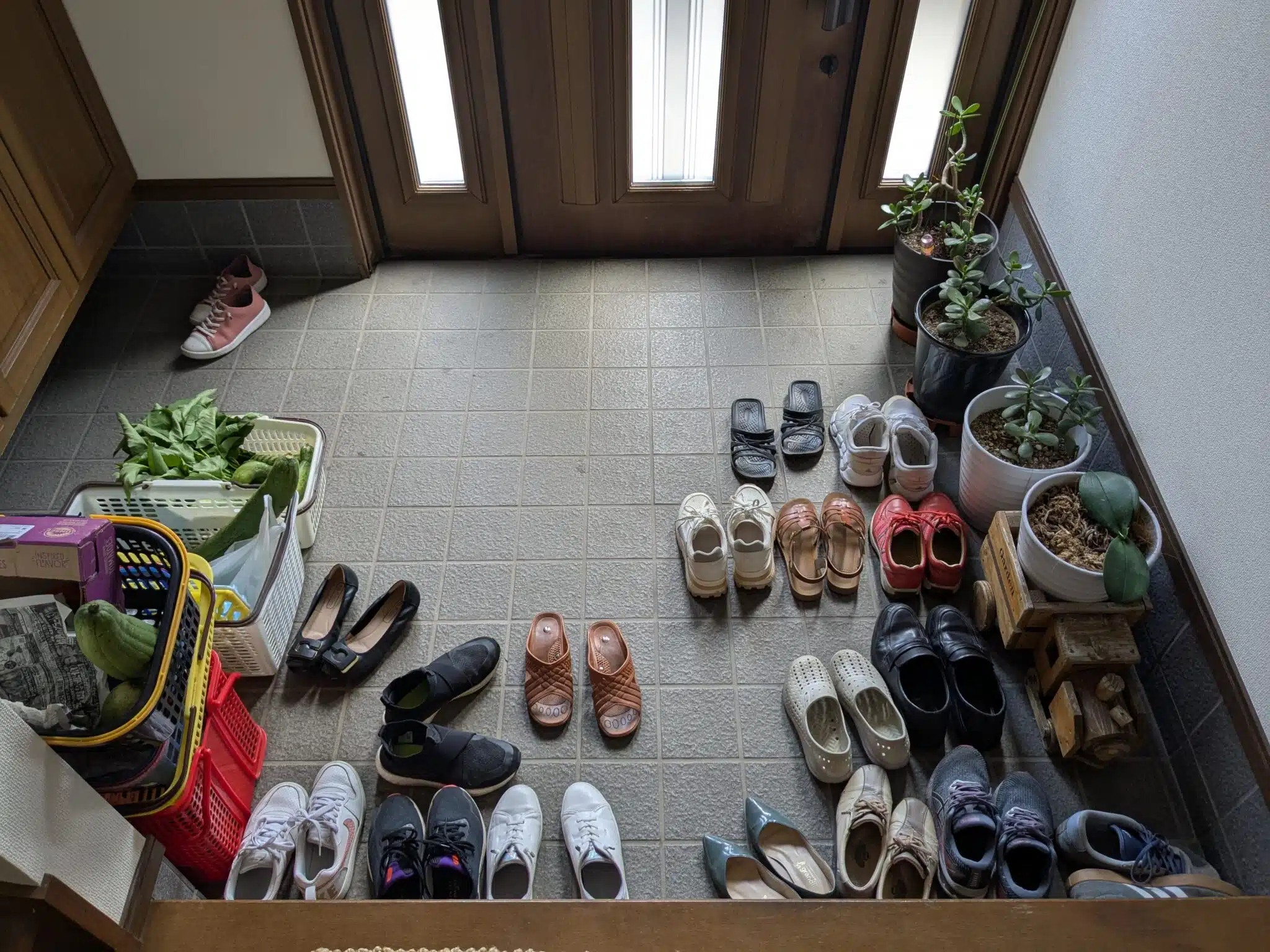
Beneath this warmth of hospitality lies a quieter tension: most Yiguandao congregants in Japan, I was told, are Chinese nationals. In the past, they, too, would visit Buddha halls in Taiwan with ease and enthusiasm. After China’s Ministry of Culture and Tourism imposed a travel ban on citizens to Taiwan in 2019, such trips are now possible only for those who have exchanged their Chinese passports for Japanese ones.[4] For converts who regularly return to China to visit with family and friends, the relative tolerance of the past has given way to a new vigilance under President Xi Jinping’s intensifying campaign against religion.
According to Chinese authorities, Yiguandao is xie jiao (邪教), an illegal organization (or cult) that uses “heterodox teachings” to trick individuals and endanger society. For the past two years, I have spoken with countless Yiguandao missionaries from Taiwan who have traveled to and throughout China for decades. All have described a worsening danger under President Xi Jinping, including tightened surveillance, police harassment, as well as the detention and imprisonment of increasing numbers of both Taiwanese missionaries and Chinese adherents. Stories are also told of missionaries disappearing from Hong Kong, presumed to have been taken over the border into mainland China. In the past, Taiwanese missionaries faced next-day deportation; today, they disappear into the Chinese prison system for months or years at a time. My interviews with Taiwanese missionaries released from long-term detentions in Chinese prisons attest to inhumane conditions and a total lack of access to legal services. One man with astigmatism had his glasses confiscated for the first six months of his one-year detention, and did not learn of his mother’s death until he was released and returned to Taiwan.
Over the course of a week, I was afforded the privilege of interviewing six Chinese women who immigrated to Japan and have since converted to Yiguandao. They now find themselves navigating an uneasy freedom, shaped by a faith they express gratitude for—and the persistent reach of the Communist Party of China (CPC).

A New Life in Japan
For Ms. L, migration from China to Japan was both escape and rebirth. Growing up in the rice-paddy suburbs outside Shanghai in the 1980s, she lost her mother young and experienced a strained relationship with her stepmother. Her grandmother, however, pushed her to study, and she moved from technical training to accounting, eventually finding work in a warehouse. But during China’s late-90s reform of state-owned enterprises, she saw many workers laid off. “Before, you would have two people sharing a job; you’d finish quickly and have nothing to do for the rest of the day,” she recalls, “Then there were mass layoffs (裁員 cai yuan), they were firing people.”[5]
Married young at 20 years old, Ms. L eventually divorced her first husband and began again. A relationship with a Japanese man opened the door to a new country, a place she imagined as peaceful and free. “In China, my family had too much influence,” she tells me, “Moving to Japan meant starting life over.”
When asked about her religious beliefs before moving to Japan, Ms. L says that she grew up practicing Chinese folk religion (民俗習慣 minsu xiguan), but adds, “Of course, according to the CPC, everything is superstition (迷信 mi xin).”[6] Ms. L. has kept her conversion to Yiguandao a secret from her family. “I can convert because I am free, I live in Japan,” she says, “But I have not told my family in China. I don’t want to cause them trouble.”
Between Two Worlds
Ms. W takes a sharper tone. Similar to Ms. L, she has lived in Japan for more than twenty years, although she is now a naturalized Japanese citizen and has given up her Chinese passport.
“Xi Jinping is very strict,” she says, “When I was young, religious practice was not a big issue. People from any religion could gather together, even Christians. Over the past few years, the situation has become much stricter. Religion and faith are suppressed (打壓 da ya).”
A third woman, Ms. Z, is incredulous about these claims. Ms. Z moved to Japan eight years ago as a single woman, and today lives alone in Tokyo with her dog. She confesses she has not learned much Japanese and remains tightly embedded in the Chinese community, both at home and in Tokyo. She performed the conversion ceremony to join Yiguandao in 2024, though herself admits that she does not know much about the faith.
“Is it that strict in China? I’m not aware…” Ms. Z interrupts our conversation, drifting off when she realizes the rest of the room appears to agree with Ms. W.
“Yes, of course it’s different now,” Ms. W continues, “In the past, everyone could talk about politics, but now everyone is too scared.” When asked if anyone speaks about politics in China today, Ms. W lowers her voice, “At home, you can…but it is not convenient. This is not easy to discuss (這個不好說).”[7]
Raised in a family that practiced Chinese folk religion (拜拜 bai bai, typically in the form of making offerings at temples or home altars), Ms. W is grateful that she was able to help her mother 求道 (qiu dao), or “Receive the Dao,” in a secret Yiguandao initiation ceremony in Northeast China several years ago. For Yiguandao believers, the qiu dao ceremony is a vital first step in saving the souls of initiates, and is often performed upon first contact. Little emphasis is put on an individual’s understanding of Yiguandao before this “conversion” ceremony takes place; it is believed that the Dao[8] will guide believers on their journey of self-cultivation after this initial step is completed.

Speaking of her mother’s conversion to Yiguandao, Ms. W is both relieved and cautious. There is no way for her to bring Yiguandao texts to China to help her mother develop her faith; such texts are illegal in China, and Ms. W describes experiencing intensified scrutiny and harsh questioning at the Chinese border after adopting Japanese citizenship.
“What are you doing? Why are you coming back?” Ms. W recounts of border officials’ questioning, “Are you bringing anything illegal back with you?”
Her experience is backed up by a Taiwanese missionary who, prior to being targeted by Chinese police authorities, regularly made trips to China.
“If you take any books with you, Chinese customs will ask you, ‘Why are you bringing these books? What are they about? Why are you coming into China?’” the missionary adds, “In the past, you could get away with it, but it has gotten so much stricter over the past few years.”[9]
Indeed, my conversations with Ms. W over the next few days reveal a deep sense of injustice with regards to China’s evolution in the past 20 to 30 years. She speaks of corrupt elites buying houses abroad to flee a system of their own making,[10] and of the oppression of Uyghurs in Xinjiang.[11] “My neighbor [in China] conducts business in Xinjiang and told me about people being shot there. This thing is 100% true,” she says, “The rich can do anything. Ordinary people can’t even speak.”
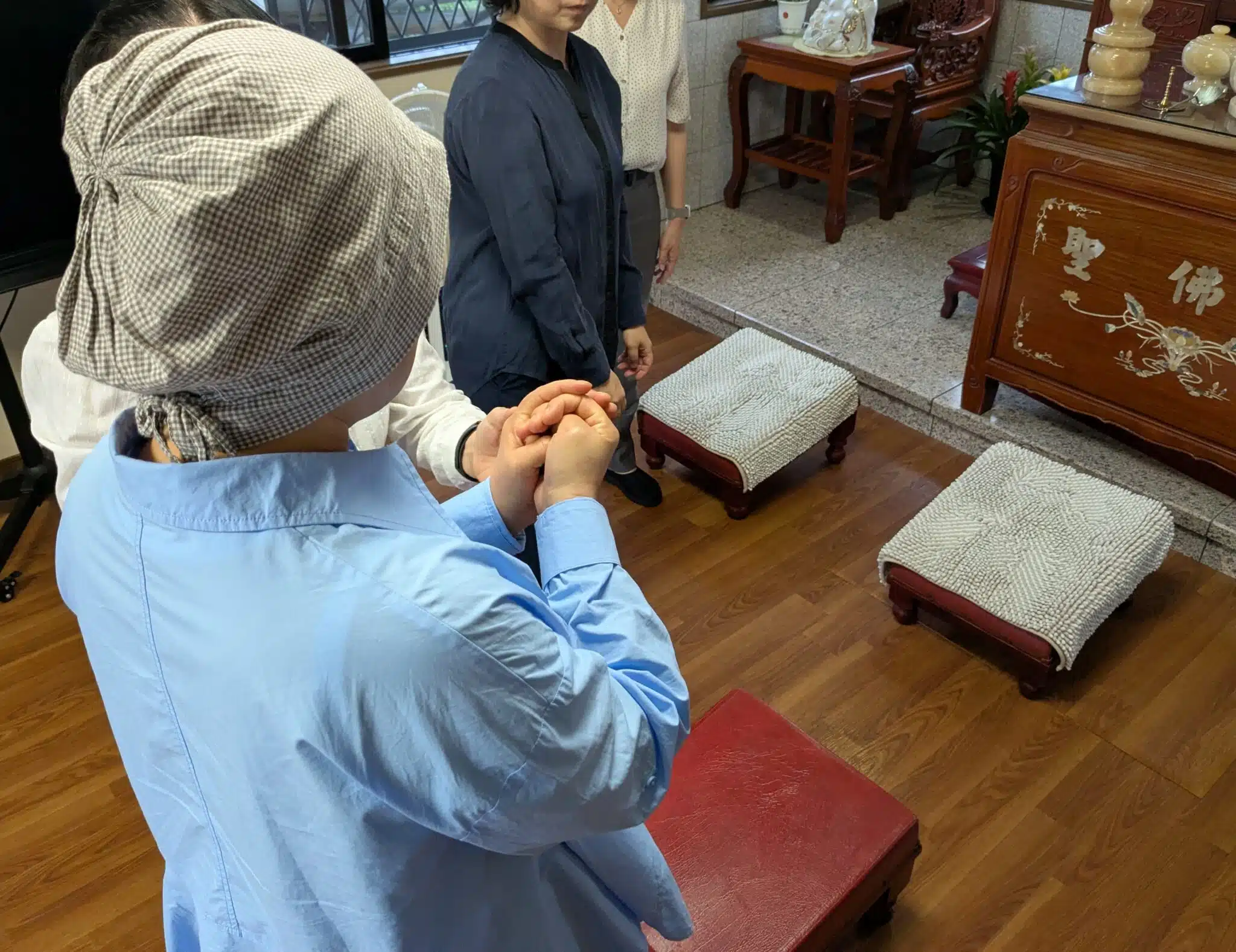
Ms. Z, who only recently immigrated from China and is still learning about Yiguandao, remains incredulous. “In China, we have many different religions. It’s a personal thing for each individual,” she tells me. “We have temples in China; everyone can bai bai. There is no problem. We also have churches…”
Ms. W takes a different point of view. “Yes, there are big Buddhist temples in China, and everyone is free to go to them. But many temples are built by the CPC, and all of them are managed by the CPC. Religious groups cannot freely build their own structures.”
“[Chinese temples] are more like museums, like a national museum,” Ms. W continues, describing these sites as cultural capital to be used by Chinese authorities, rather than places of authentic religious practice. “[As for churches], there are so many things church leaders can’t say. The CPC punishes specific groups to set an example to the others.” She uses a Chinese idiom to describe this phenomenon: “kill the chicken to show the monkey” (刣雞教猴).
Ms. Z stands firm, describing religion and spirituality as a strictly personal issue in China. “I don’t have any experience of these things,” she says, “In China, everyone is free to take care of their family (大家平安), which is the most important thing.”
Later in the conversation, Ms. Z is warned by the group not to discuss Yiguandao when she returns to China. This, too, is news to her. “I still don’t know a lot about Yiguandao,” she tells me, “and I won’t discriminate between other religions. My faith is very simple; I just know about trying to become a good person and self-cultivation. This thing I can accept. It is fate (緣分 yuan fen) that I came to Yiguandao.”
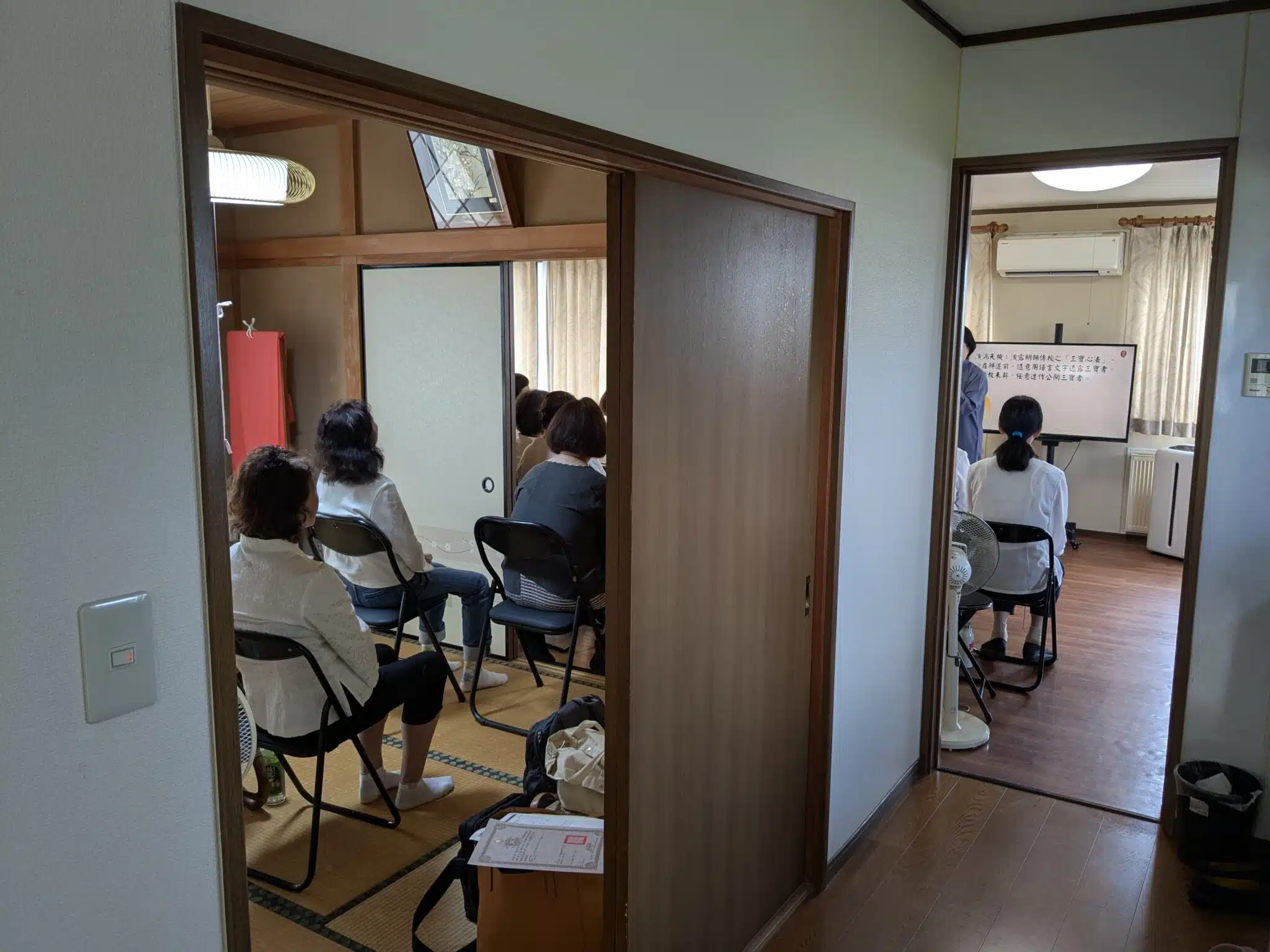
Faith as Joy and Work
Then there is Ms. Q from Shanghai, sixty-five and sparkling in a white Yiguandao shirt threaded with silver detailing. She laughs easily, and peppers her sentences with “對不對,”— “Don’t you agree?” Her energy is infectious.
Ms. Q was initiated into Yiguandao shortly after arriving in Japan two decades ago, after being introduced by a friend. Work and caring for her children took up most of her time in those early years, she tells me, but she has become more devout in recent years—even attending an international Yiguandao gathering in Taiwan eight years ago. She is disappointed that she is unable to return to Taiwan under the current travel ban for Chinese citizens. “This thing is such a shame,” she sighs, “I would love to go back.”
Becoming a vegetarian, she admits, remains her greatest struggle. “But I am proud of my progress! I have gone completely vegetarian for breakfast. I eat vegetarian every morning!” She cooks meals for the Buddha hall group twice a month, drawing on her experience running a restaurant.
Her warmth stands in stark contrast to the hostility Ms. Q faces from old friends in Shanghai. When they recently planned a visit to Japan, she offered them free accommodation via her Yiguandao community in Tokyo. Her friends recoiled, “They asked me how I could have gotten involved with these people. They did terrible things in China forty years ago. They told me to leave the group immediately and move back to China.”[12] She received warnings from several concerned friends and, soon after, was removed from their chat group.
Her response is pure Shanghai bluntness. “放屁![13] Nonsense! I’ve met these people. My experience is that these people are good people. Your experience is your experience, my experience is my experience. Can’t you think for yourselves?” Her voice rose as she defended her community: “他們都很善良, 對不對? 很貼心, 對不對? They are all so kind, don’t you agree? So caring, don’t you agree?”
For Ms. Q, her faith is practical and capable of delivering daily miracles. Once, during a turbulent flight, she clasped her hands and recited the “three treasures” (三寶 san bao) and instantly felt calm. “It worked,” she says, “like magic—神奇 (shen qi).” Even rain, she tells me, will sometimes stop if she prays before going out.
Ms. Q traces her belief in the divine back to childhood, when she accompanied her mother to donate money to temples destroyed during China’s Cultural Revolution (1966–1976). In adulthood, she remembers writing her son’s name on prayer slips; now, “wherever he goes, he makes money.” Proof, she says, that faith brings fortune.
Her son was initiated into Yiguandao in Shanghai ten years ago, in a secret ceremony attended by four Taiwanese missionaries. Based in Shanghai without access to a Buddha hall, her son is not a practicing believer, but she regularly reminds him that his good luck is due to her prayers.
Having retained her Chinese citizenship—and the requisite access to China’s social welfare benefits—Ms. Q still travels to China two or three times a year thanks to her son’s purchasing of her plane tickets (another source of pride). She avoids any mention of Yiguandao when in China. “I just say I go to a Buddha hall in Japan, eat vegetarian food, and that I am very happy here,” she says, “People can misunderstand you if you tell them you are a member of Yiguandao. It is better to let them see for themselves.”
She proudly sends photos of her vegetarian cooking to friends in China, and one friend now plans to visit the Buddha hall in Tokyo next spring. “She will see with her own eyes,” Ms. Q beams.
Two decades after leaving China, she no longer dreams of returning. Japan is her home, and she is grateful for the impact both Japanese culture and Yiguandao have had on her life.
Ms. Q doesn’t appear to hold strong opinions about the more controversial aspects of her faith. Regarding religious control and censorship in China, she shrugs matter-of-factly. “You can’t talk about these things on WeChat [the main form of social media and texting in China];[14] it’s better to speak in person,” she says, “Chinese leaders have their own thoughts (看法 kan fa), don’t you agree?”
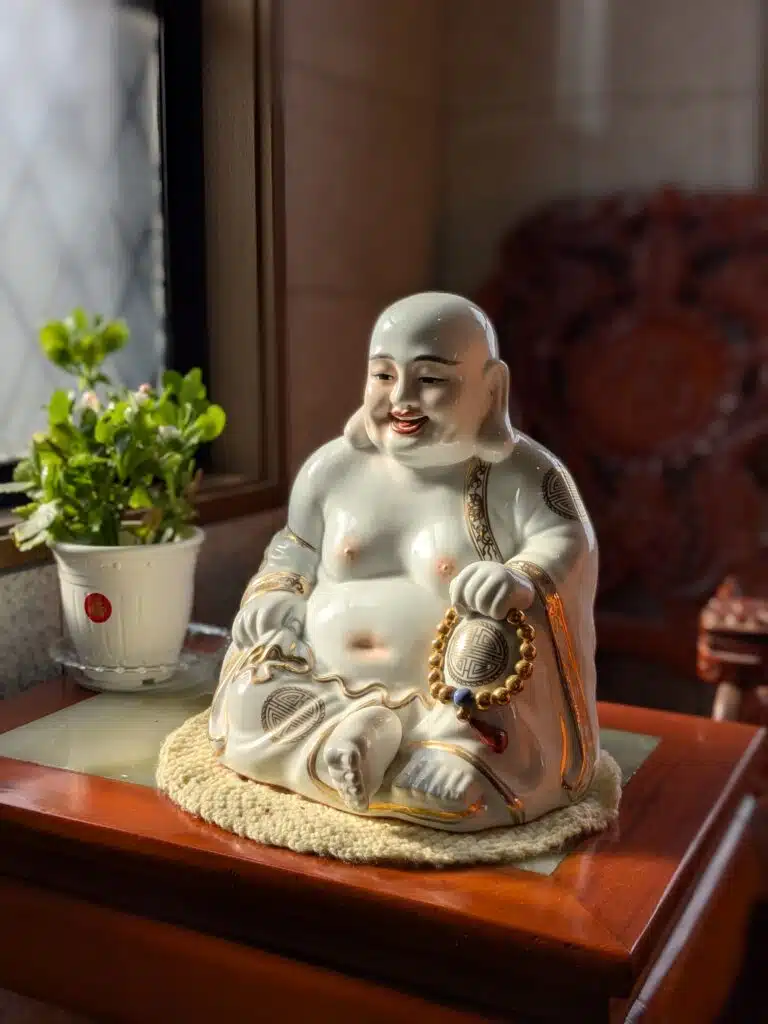
If Ms. Q’s faith radiates ease, Ms. S—another migrant from Shanghai, now in her late sixties—channels hers into discipline. Ms. S arrived in Japan in the late 1980s, became a naturalized citizen after six years, and was initiated into Yiguandao in 2005. Since then, she has led 108 people to convert to Yiguandao, including family, classmates, and even former teachers in Shanghai. She has kept track of their names and phone numbers in a book, so as to keep count of how many souls she has saved.
Censorship in China has forced Ms. S to be creative. In China, she never uses the phrase “Receive the Dao” (求道 qiu dao) with converts, and instead uses a safer, Buddhist term. “It’s the same truth, just a different name,” she smiles. Her experience reflects what other missionaries have told me: you cannot say the three characters “Yi,” “Guan” and “Dao” in China. It is wiser to link initiation ceremonies and the need for self-cultivation to Buddhism or folk religion; one can assume most recent converts to Yiguandao will not learn they have joined the group for as long as they remain in China.
Ms. S’ story of her faith is peppered with miracles. When her mother was initiated into Yiguandao and later died, her body stayed soft for three days. “Usually bodies are stiff by the second day, but her arms and legs could move like this,” Ms. S demonstrates, “Because of the three treasures, her soul went to heaven and her body was at peace. I saw it with my own eyes.”
Ms. S wakes daily at 5:30 a.m. to recite her prayers and the three treasures. Her faith is intertwined with the logic of effort and reward: in accordance with Yiguandao teachings, the more devoted one is to the Dao, shares the faith and cultivates the self, the higher one ascends into heaven. At the highest level, devotees commune with the deities themselves, and have the chance to ask to be reincarnated and return to earth to help save more souls. I have met several Yiguandao members who believe they are reincarnated from elders of the past, explaining their present devotion and mission to save more souls.
Upon her initiation to Yiguandao, Ms. S traveled to the outskirts of Taipei, Taiwan, to meet with teachers and learn more about her new faith. Unwilling to give up eating meat and unable to host a Buddha hall in her home, Ms. S asked her teachers how she might otherwise earn spiritual merit. The answer: save more than 100 souls. She did—108 souls, to be exact.
“I took every single person out to eat to explain Yiguandao and the story of my faith,” she said, “That’s with all my own money. I spent a lot of money, right? (不少錢, 對吧)?” She laughs. “Now, even though I’m not a vegetarian, my level in heaven is the same as a tan zhu (壇主, or Buddha hall host).”

Faith and Caution
Not everyone was so open in discussing their experiences. One woman from North China, living in Japan with her Chinese husband for a decade, spoke to me only briefly. She, too, was initiated to Yiguandao in Japan, has visited Taiwan for additional education, and led her family and neighbors back in China to qiu dao. Her relatives in China have even turned their home into a Buddha hall. She found a reason to end our conversation rather abruptly, however, and left to speak in hushed tones to a missionary on the other side of the room.
In a separate conversation, that same missionary—who had initially been eager to discuss Yiguandao spiritual teachings with me—grew uneasy when I guided the conversation toward activities in China. At one point, a Taiwanese devotee offered details about conversion gatherings in China, and the missionary immediately switched to speaking Taiwanese to warn her against giving any further details, wary of what I might record or publish.
His unease is understandable. The missionary’s wife still lives in China, and he makes regular visits home. In the past, he would try and spread Yiguandao to his network in China, but now the risks are too great. He tries to witness to them by living a good life, but nothing more.
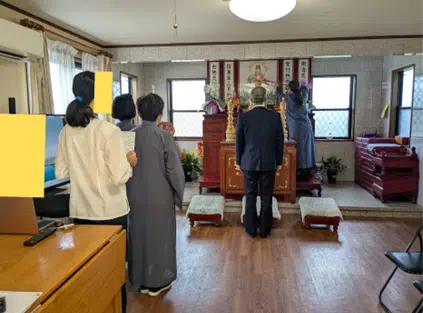
Light Across Borders
Immigration to Japan offers devotees a sense of safety and an environment where they can pray without fear, host gatherings and attend classes. Yet the shadow of authoritarianism remains: hushed conversations, ended friendships, and, in the most extreme, a deep fear of losing loved ones to China’s opaque network of prisons—several times described tactfully as a fear of causing “inconvenience” (麻煩 ma fan) for those back home.
Rather than a single portrait of conversion, these stories form a mosaic of belief and denial, naivety and resistance, and at times even anger. For some, Yiguandao represents miracles and personal comfort; for others, it is a mission to save souls, one conversation at a time. Believers’ experiences underscore how Yiguandao’s transnational networks provide both religious continuity and a fragile sanctuary in an otherwise unpredictable political climate. Their lives are a testament to how faith endures, quietly and persistently, within and beyond political boundaries.
Notes
- “Yiguandao” is often transliterated to “I-Kuan Tao” in 20th century scholarship, in line with the older Wade-Giles system of Chinese romanization. The modern Pinyin system has since become standard in both academic and contemporary contexts; this report uses “Yiguandao” accordingly. ↑
- This open-door policy is meant to both nurture faith and bring others into the fold. ↑
- During our time in Tokyo, we were joined for several days by a Taiwanese missionary who has been based in the Dominican Republic for the past two years. His attendance was warmly welcomed by the rest of the group, and provided a chance to share stories of conversions and miracles taking place on the other side of the planet.↑
- Time Magazine (2019), “China Bans Citizens From Traveling to Taiwan as Individual Tourists,” 31 July, citing Bloomberg. ↑
- During the last five years of the 20th century, some 30 million Chinese urban workers are estimated to have lost their jobs as a result of state-owned enterprise reform. See Ho, L. F. (2002) The Making and Melting of the “Iron Rice Bowl” in China 1949 to 1995, Chinese University of Hong Kong, 35(3):258–273, https://www.researchgate.net/publication/229932495_The_Making_and_Melting_of_the_Iron_Rice_Bowl_in_China_1949_to_1995. ↑
- Eliminating “superstitious beliefs” forms a key part of the CPC’s plan for “socialism with Chinese characteristics” and “the great rejuvenation of the Chinese nation.” Cultural reform policies, for example, express the need “to foster a scientific spirit, popularize scientific knowledge, and advocate freeing oneself from old backward customs and opposing feudalism and superstition.” See Decision of the CPC Central Committee on Major Issues Pertaining to Deepening Reform of the Cultural System and Promoting the Great Development and Flouring of Social Culture (中共中央關于深化文化體制改革推動社會主義文化大發展大繁榮若幹重大問題的決定), Adopted at the Sixth Plenary Session of the 17th Central Committee of the Communist Party of China (中國共產黨第十七屆中央委員會第六次全體會議通過), effective 18 October 2011, http://www.lawinfochina.com/Display.aspx?lib=law&Cgid=160202&EncodingName=big5.↑
- At many times during the interview, Ms. W. returned to this expression, “This is not easy to discuss” (這個不好說), when addressing sensitive topics. ↑
- The Dao (道) is a fundamental concept in Chinese philosophy meaning the “way” or “path.” It represents the underlying principle of the universe, and its meaning is highly context dependent. “Yiguandao” translates to “the Consistent Way” or “the Way of Pervading Unity.” ↑
- Taiwan’s Mainland Affairs Council (MAC) has issued multiple warnings to Taiwanese citizens to exercise “extreme caution” when traveling to China, Hong Kong, and Macau. Religious practitioners are at additional risk of arrest and detention. See: Hatfield, A. (2024), “Taiwan warns religious practitioners of risks in China amid reports of detentions,” RTI News, April 12, https://www.rti.org.tw/en/news?uid=3&pid=28974 and Culture Center of Taipei Economic and Cultural Office in Chicago, U.S.A. (2024), “MAC requests release of 3 I-Kuan Tao members arrested in China,” OCAC, 13 December, https://www.ocac.gov.tw/OCAC/SubSites/Pages/Detail.aspx?site=d8b2e08f-ffe2-4b54-92de-b5b0b6343ab3&nodeid=1974&pid=71307330. ↑
- See Yu, M. (Host). (2024) Millionaires Flee China, CCP Money Floods US Universities, and Doping Overshadows Chinese Olympians [Audio podcast episode], in China Insider, Hudson Institute, August 20, https://www.hudson.org/global-economy/china-insider-millionaires-flee-china-ccp-money-floods-us-universities-doping. ↑
- Maizland, L. (2025), “China’s Repression of Uyghurs in Xinjiang,” Council on Foreign Relations, October 3, https://www.cfr.org/backgrounder/china-xinjiang-uyghurs-muslims-repression-genocide-human-rights. ↑
- Mentions of Yiguandao on Chinese social media are heavily censored. The only material available is long, propaganda style articles accusing the group of committing a number of crimes during the first half of the 20th century, including collaboration with counter-revolutionaries, mass rape, poisoning and disturbing public order. ↑
- Translated literally, “fart.” ↑
- McDonell, S. (2019) “China social media: WeChat and the Surveillance State,” BBC, 7 June, https://www.bbc.com/news/blogs-china-blog-48552907. ↑